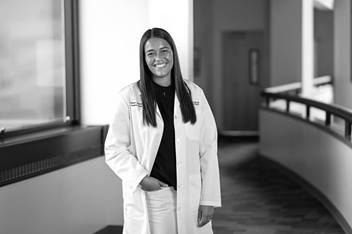Conferences and Education
The conference and didactic programs are designed to provide the necessary science and clinical materials to fully prepare the fellows for the American Board of Allergy and Immunology, as well as to ensure the fellows provide state of the art care and to enable them to evaluate and present data. Professionalism and empathy with the patient are emphasized at all times. Our goal is to provide a solid foundation for a life long program of self directed learning.
Orientation
During the first month the fellows receive an intensive orientation to the specialty and the program, with most conferences providing a survey of the data that will be presented in greater detail over the next two years. Following the orientation period, the conferences are generally divided into the following areas:
- Immunology Book Club:
To provide fellows with an in depth review of immunologic concepts, including cellular and molecular biology, using the basic immunology texts such as Clinical Immunology: Principles and Practice by Robert R. Rich, and other materials as appropriate. - Allergy Book Club:
To provide the fellow with a broad background in allergic conditions and familiarize them with clinical references. Utilizing the text, Middleton’s Allergy, Principles and Practice as a base reference, the fellow will become familiar with the broad range of diseases that are part of the subspecialty of Allergy and Immunology, the therapeutic options available, and the risks and benefits of these options. - Research Methods:
Methods are taught through a series of formal lectures designed to teach deductive reasoning, the use of statistics, and methods to develop sound and scientifically validated conclusions. This is a practical program, designed to work with our journal clubs to develop skills in evaluating methods, statistics and the use of data. Fellows also learn from individual mentors while working on projects and learn by listening to reports of the work, as well as problems and successes of other fellows. It is expected that the fellows research work will lead to the presentation of their own data in abstract, written, poster and verbal formats that are reviewed and critiqued by staff during every step of the process. This will solidify understanding of research concepts, develop expertise in research skills, and refine presentation skills. - Journal Club:
This is a practical program using current medical literature and classic articles from the past to evaluate the investigator’s methods, statistics and discussion, and to look for potential bias in medical research. The fellow will learn to evaluate controversies and changes in allergic and immunologic diseases and their care. This program is also designed to provide an appreciation for reviewing the latest medical findings and developing a sense of self directed life long education. - Case Conferences:
The purpose of case conferences is to provide fellows with experience in presenting complex patients to their peers, and to provide an increased breadth of experience with challenging and/or unique cases. This will give fellows increased insight into the use of diagnostic and therapeutic modalities and allow them to develop enhanced skills in using the medical system to help their patients. - Diagnostic Laboratory and Immunology:
This course is designed to develop the knowledge necessary to utilize the clinical immunology laboratory in the practice of allergy and clinical immunology. This will ensure the fellows understand the methods used, the underlying principles on which the tests are designed, and the limitations and pitfalls associated with the essays. - Seminars in Allergy and Immunology:
The seminars program is designed to provide an in depth review of topics of interest within the broad field of Allergy and Immunology. Topics will be provided by the program director and staff to round out the overall educational requirements. Topics can range from questions raised in other conferences, results from tests such as the in-service examination and the American Board of Allergy and Immunology test, and from needs assessments evaluations. - Board Review:
Success on the board examinations is an important part of each fellow’s transition to independent practice. The board review series focuses specifically on preparing the fellow for the in-service examination and ultimately to help prepare the fellows to pass the boards. This is primarily a question based learning experience where fellows become comfortable with board like questions while discussing the nuances of reading test questions and answers.
Fellows will also be expected to attend conferences at regional and national meetings.



